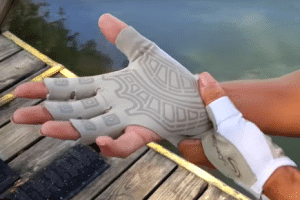Rowing is incredibly rewarding.
But it can be hard on your hands.
If you are unaware, rowing often causes blisters on the hands. This is sometimes called a natural process by experienced rowers.
After blisters, your hand form calluses to deal with the friction from the rowing machine handle.
You can learn about it in detail in this guide.
But first, here are our top picks for the best rowing gloves.





When it comes to blisters, you only have two options. You can either avoid them or heal them. If you are not careful, you will get painful blisters which will disrupt your training routine.
Rowers get blisters on their hands due to many reasons. But the most common reasons are listed below:
Suppose you got a new rowing machine. You are all gung-ho about it and want to get that modelesque physique. But the over-enthusiastic energy could lead to blisters as your hands may not have the hardened skin tissue or calluses to sustain the long workouts.
With each rowing session, your hands will rub against the handle surface. The more intense the workout, the more friction there is. So if you start training excessively, your hands are bound to form blisters.
Sweaty hands make things worse. Wet or sweaty hands produce more friction when rubbing against the rowing machine handles.
Due to more friction, they develop blisters faster. Therefore it is essential to wear rowing gloves to ease the friction created due to sweating.
You can also wear wrist bands to prevent the sweat on your arms from reaching your hands.
Beginner rowers sometimes grip the handles much tighter than needed to “feel” the intensity of rowing. However, you can still have an intense workout with a relaxed grip. The intensity depends on the speed with which you pull the handle
You can’t keep a loose grip on the handle either. One has to learn to find the balance.
If you develop blisters on your palms, it is a sign that your grip is tighter than necessary. Usually, blisters are supposed to form above the palms and below the knuckles.
Another thing to look for is that you keep your wrists straight. Bending your wrists can lead to an improper grip and high amount of friction. This can also cause blisters.
Since the main reasons behind formation of blisters is the friction between your hands and the handles, it makes sense to use rowing gloves. Rowing gloves can solve the problem instantly. So why not?
Rowing gloves have immense benefits for rowing and protecting your hands. Here is how they help you row in different ways:
Okay, this one is a no-brainer. If you wear rowing gloves, you won’t get blisters as the friction won’t be as much as rowing without gloves. Blisters are painful, what you want to develop is calluses. Calluses protect your hands from further friction since the skin is now hardened.
As explained above, calluses are good for you. They protect your hands from further friction. But overdeveloped calluses can become a problem. When the calluses get too thick, you will need to clip off the upper layer of dead skin or sand it. Thick calluses can lead to an improper grip, further worsening the situation.
Wearing gloves can help you form calluses slowly. This can be done by wearing gloves for long rows and removing them on short rows.
If you have blisters on your hands, wearing gloves can help with the healing process. Having blisters doesn’t have to stop you from rowing if you wear rowing gloves. Wearing gloves will make sure the blisters don’t go worse and you don’t get an infection.
Wearing gloves is a good way to avoid calluses from forming. Some people just don’t like the aesthetic look of calluses on their hands. Whether you have OCD when it comes to your looks or you want to be gentle while holding your girlfriend’s hands, rowing gloves can ensure that your hands stay gentle and callus-free.
Yes, you should not increase the time of your rowing abruptly. But rowing gloves can help you take your rowing time up a couple notches. Whether you took a break from rowing or want to get results faster, gloves can help you climb up a few levels.
Not all rowing machines are as perfect as the Concept2. If the rowing handle is positioned in such a way that your hands or arms stay in an uncomfortable position,, wearing rowing gloves can provide a better position to work with.
If your hands tend to get sweaty during rowing, wearing gloves can help ease off the friction. It can help you get a longer and more intense workout each time.
There are many types of gloves in the market. Some cover your hands fully, others only cover your palms and the lower part of your fingers. Others are in the form of grip pads that don’t even look like gloves. So which one to buy?
As Concept2 suggests, weight lifting gloves work well for rowers in general.
Finally, here is our top pick again:

See also:
